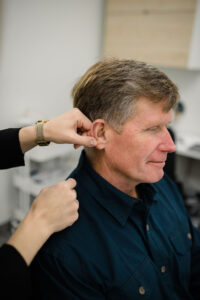When we think of hearing loss, we usually focus on the obvious challenges such as difficulty following conversations, needing to turn up the TV, or missing sounds in daily life. But there’s another lesser-known consequence of hearing loss that many people experience: fatigue.
If you or someone you know feels unusually tired after socializing or spending time in noisy environments, hearing loss may be playing a role.
Why Does Hearing Loss Cause Fatigue?
The Brain Works Harder to Hear
Hearing isn’t just about your ears! Your brain plays a key role in processing and interpreting sounds. When hearing loss is present, the brain has to work harder to fill in the gaps.
Imagine trying to read a book with half the words missing. Your brain is constantly guessing, predicting, and trying to make sense of incomplete information. This same mental strain happens when you’re trying to follow a conversation with hearing loss, especially in noisy environments or group settings.
Over time, this listening effort can become exhausting, leading to cognitive and physical fatigue.
Social Situations Become More Draining
People with hearing loss often need to concentrate intensely during conversations, lip-read, or ask others to repeat themselves. This mental multitasking takes energy. What should be simple interactions like chatting with friends or attending a meeting can feel draining or overwhelming.
As a result, many people with untreated hearing loss report feeling:
- Tired after social events
- Less inclined to participate in group conversations
- Frustrated or anxious in noisy settings
Hearing Loss Can Affect Sleep and Mood
There’s also an emotional side to hearing loss. Struggling to hear can lead to stress, anxiety, and depression, all of which can interfere with mental health and have an impact on restful sleep. Over time, poor sleep and emotional strain contribute to chronic fatigue, creating a cycle that’s hard to break.
Signs You May Be Experiencing Hearing-Related Fatigue
- You feel wiped out after a day at work or social interaction
- You find noisy environments especially tiring or stressful
- You withdraw from conversations to conserve energy
- You experience headaches or tension after long listening periods
- You notice memory or focus problems after listening for long periods
 What Can You Do?
What Can You Do?
- Have a Hearing Assessment – If you suspect hearing loss, the first step is to see an audiologist for a hearing assessment. Even mild hearing loss can have a significant impact on your brain and energy levels.
- Use Hearing Aids If Recommended – Hearing devices can reduce listening effort by amplifying and clarifying sound. Many people notice a significant decrease in fatigue once their hearing is properly supported.
- Take Listening Breaks – Just like eye strain from screen use, your ears and brain need rest too. Take quiet breaks during long conversations or noisy events.
- Optimize Your Environment – Sit closer to speakers in meetings, reduce background noise when possible, and use assistive listening devices to reduce listening effort.
Conclusion
Hearing loss is not just about what you can or can’t hear. It’s about how much energy your brain is using just to keep up. If you’ve been feeling more tired than usual, especially after socializing or being in loud settings, it may be time to consider whether hearing loss is playing a part.
By identifying and managing hearing loss early, you can reduce fatigue, improve your social interactions, and regain the energy to fully enjoy life.
Reconnect and Recharge
If you or a loved one experiences listening fatigue or difficulty hearing, schedule an appointment today for a diagnostic hearing assessment or consultation on treatment options.
Clayton Park Audiology and Hearing Aid Centre
Unit 5, 362 Lacewood Drive, Halifax
902-405-0515 | info@cpaudiology.ca
References
-
Jiang, K., Spira, A. P., Lin, F. R., Deal, J. A., & Reed, N. S. (2023). Hearing Loss and Fatigue in Middle-Aged and Older Adults. JAMA Otolaryngology – Head & Neck Surgery, 149(8), 758–760. https://jamanetwork.com/journals/jamaotolaryngology/fullarticle/2806828
-
Holman, J. A., & Hornsby, B. W. Y. (2021). Can listening-related fatigue influence well-being? International Journal of Audiology, 60(11), 853–860. https://www.tandfonline.com/doi/abs/10.1080/14992027.2020.1853261
-
Burke, L. A., et al. (2020). Daily-life fatigue in mild to moderate hearing impairment: Temporal and contextual correlates. Ear and Hearing, 41(6), 1531–1539. https://journals.lww.com/ear-hearing/fulltext/2020/11000/daily_life_fatigue_in_mild_to_moderate_hearing.10.aspx
-
Turunen-Taheri, S., Carlsson, P.-I., Ternevall, E., & Hellström, S. (2023). Mental fatigue in patients with hearing loss and/or tinnitus undergoing audiological rehabilitation—a pilot study. Journal of Clinical Medicine, 12(21), 6756. https://www.mdpi.com/2077-0383/12/21/6756
-
Holman, J. A., et al. (2019). Hearing impairment and daily-life fatigue: A qualitative study. International Journal of Audiology, 58(11), 741–748. https://pmc.ncbi.nlm.nih.gov/articles/PMC6567543/

Author
Patricia Gazeley
REGISTERED AUDIOLOGIST
Patricia is a passionate advocate for hearing health, inspired by her personal experience with hearing loss. She empowers others through education to take charge of their hearing health and become advocates for themselves.
